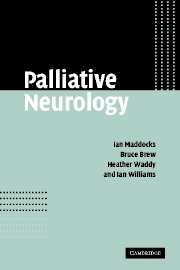Book contents
- Frontmatter
- Contents
- Foreword
- Note on drugs and abbreviations
- Section I Palliative Management
- Section II Major discomforts in advanced neurological illness
- 1 Fatigue
- 2 Problems with muscles and movement
- 3 Bulbar symptoms
- 4 Respiratory symptoms
- 5 Gastrointestinal symptoms
- 6 Urological symptoms
- 7 Pain
- 8 Cognitive, behavioural and psychological symptoms
- 9 Miscellaneous symptoms
- Section III Major neurological conditions requiring palliation
- Section IV Ethical issues
- Section V Appendices
- Index
8 - Cognitive, behavioural and psychological symptoms
from Section II - Major discomforts in advanced neurological illness
Published online by Cambridge University Press: 08 January 2010
- Frontmatter
- Contents
- Foreword
- Note on drugs and abbreviations
- Section I Palliative Management
- Section II Major discomforts in advanced neurological illness
- 1 Fatigue
- 2 Problems with muscles and movement
- 3 Bulbar symptoms
- 4 Respiratory symptoms
- 5 Gastrointestinal symptoms
- 6 Urological symptoms
- 7 Pain
- 8 Cognitive, behavioural and psychological symptoms
- 9 Miscellaneous symptoms
- Section III Major neurological conditions requiring palliation
- Section IV Ethical issues
- Section V Appendices
- Index
Summary
COGNITIVE IMPAIRMENT
Global cognitive impairment, such as is seen in dementia, embraces learning, memory, motor skills and social skills. Selective loss of only some of these functions also occurs, and may be potentially reversible, being caused by anxiety, personality change or organic depression. Some degree of cognitive impairment is a feature of Parkinson's disease, Huntington's disease, progressive supranuclear palsy, cerebral tumour and the late stages of multiple sclerosis (MS).
Causes of cognitive impairment that are partially or completely reversible include hypoxaemia, hypercalcaemia, renal failure, hepatic failure, urinary or respiratory infection, hypothyroidism, B12/folate deficiency and depression. Medications that can cause cognitive impairment include benzodiazepines, opioids, tricyclic antidepressants (TCAs) and drugs with anticholinergic activity. There may be a pre-existing or emerging psychiatric disorder.
The challenge for the neurologist is to distinguish reversible conditions from those requiring only symptomatic treatment. Even in advanced disease, potentially reversible causes will usually be treated. It may be impossible to cease all potentially causative medications without a return of unacceptable symptoms (e.g. pain) but substitution of one drug by another may give significant improvement, for example substitution of oxycodone or fentanyl for morphine may reduce confusion or hallucinations.
Cognitive impairment may be subtle and unrecognized by family members, who may interpret changes in behaviour as indicating emotion or anger. They will be grateful for support in devising simple strategies to help compensate for impairment in the patient. Memory difficulties may be assisted by simple routines such as the use of lists or the display of written reminders.
- Type
- Chapter
- Information
- Palliative Neurology , pp. 111 - 119Publisher: Cambridge University PressPrint publication year: 2005



